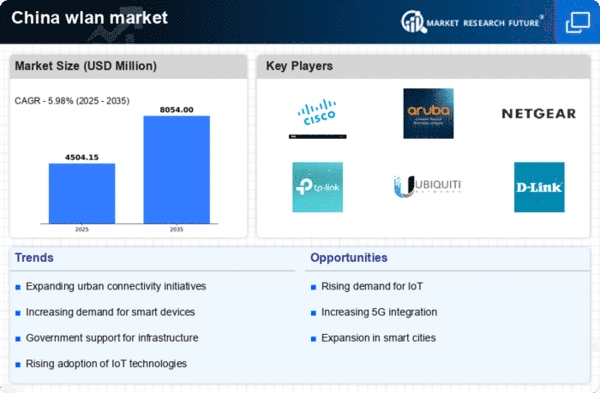Expansion of Smart Cities
The ongoing development of smart cities in China is a pivotal driver for the wlan market. As urban areas increasingly adopt advanced technologies, the demand for robust wireless networks escalates. Smart city initiatives often rely on seamless connectivity to support various applications, including traffic management, public safety, and environmental monitoring. The Chinese government has allocated substantial funding, estimated at over $100 billion, to enhance urban infrastructure, which includes expanding wireless networks. This investment is likely to create a favorable environment for wlan market growth, as municipalities seek to implement high-speed, reliable connectivity solutions to support their smart city frameworks.
Emergence of 5G Technology
The rollout of 5G technology in China is poised to revolutionize the wlan market. With its promise of ultra-fast speeds and low latency, 5G is expected to enhance wireless connectivity across various sectors. This technological advancement will likely drive demand for wlan solutions that can support the increased data traffic generated by 5G applications. The Chinese government has invested heavily in 5G infrastructure, with projections indicating that the market for 5G-related wlan solutions could reach $50 billion by 2026. As industries leverage 5G capabilities, the wlan market is anticipated to witness significant growth, driven by the need for advanced wireless connectivity.
Rising Mobile Device Penetration
The proliferation of mobile devices in China significantly influences the wlan market. With over 1 billion smartphone users, the demand for wireless connectivity continues to surge. This trend is further amplified by the increasing reliance on mobile applications for various services, including e-commerce, social media, and online education. As consumers expect uninterrupted access to high-speed internet, businesses and service providers are compelled to enhance their wlan infrastructure. The mobile device penetration rate, which stands at approximately 80%, suggests a robust market potential for wlan solutions, as organizations strive to meet the connectivity needs of a mobile-centric population.
Increased Focus on Remote Work Solutions
The shift towards remote work in China has created a heightened demand for reliable wlan solutions. As companies adapt to flexible work arrangements, the need for secure and efficient wireless networks becomes paramount. Organizations are investing in wlan technologies to ensure seamless connectivity for remote employees, facilitating collaboration and productivity. This trend is reflected in the growing market for enterprise-grade wlan solutions, which is projected to expand by over 15% annually. The emphasis on remote work solutions is likely to drive innovation within the wlan market, as providers develop advanced features to meet the evolving needs of businesses.
Government Initiatives for Digital Transformation
The Chinese government's commitment to digital transformation serves as a significant catalyst for the wlan market. Initiatives such as the 'Internet Plus' strategy aim to integrate internet technologies with traditional industries, fostering innovation and efficiency. This policy encourages investments in wireless infrastructure, as businesses and public services seek to modernize their operations. The government has earmarked billions in funding to support these initiatives, which is likely to stimulate demand for advanced wlan solutions. As organizations adapt to digital trends, the wlan market is expected to experience substantial growth, driven by the need for enhanced connectivity and data exchange.
















